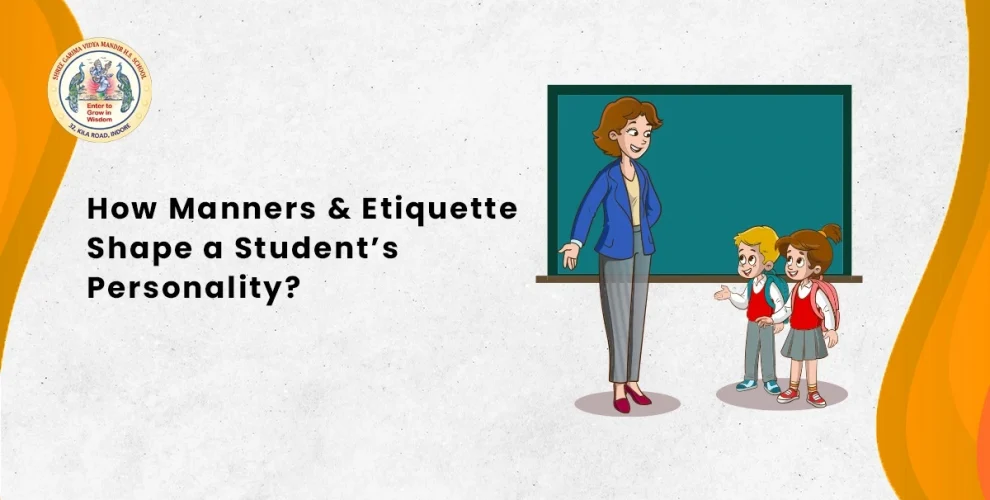“Good manners will open doors that the best education cannot.” – Clarence Thomas
Education is not just about textbooks and exams; it’s about shaping a well-rounded individual. A student’s personality is influenced not only by their academic achievements but also by how they interact with others, handle situations, and present themselves. This is where manners and etiquette play a crucial role.
Manners define how students behave in society, while etiquette teaches them how to handle different social situations with grace. Together, they create a strong foundation for personal and professional success. In this blog, we will explore the importance of manners and etiquette in a student’s personality development and how they contribute to a brighter future.
Understanding Manners and Etiquette
Before discussing their impact, it is essential to understand what these terms mean:
- Manners – The way a person behaves in different situations, showing respect and consideration for others. Examples include saying “please” and “thank you,” greeting elders, and waiting for one’s turn.
- Etiquette – A set of socially accepted rules that guide appropriate behaviour in different situations. This includes dining etiquette, classroom manners, and professional conduct.
Now, let’s understand how these qualities help shape a student’s personality.
Building Confidence and Self-Esteem
When students practice good manners and etiquette, they become more confident in social interactions. Knowing how to introduce themselves, communicate politely, and respect personal space makes them feel comfortable in any setting.
For example, a student who greets teachers confidently engages in conversations with peers, or behaves appropriately in formal settings will naturally feel more self-assured. This confidence stays with them as they grow into adulthood.
Creating a Positive First Impression
First impressions often leave a lasting impact. A student with polite behaviour, respectful communication skills, and a warm demeanour is likely to stand out positively.
Small gestures like greeting others, maintaining eye contact, and speaking politely contribute to forming a strong and lasting impression. These qualities can benefit students not only in their school years but also in their professional and social lives.
Developing Strong Interpersonal Skills
Students who learn good manners develop excellent social skills that help them:
- Build healthy relationships with classmates and teachers
- Communicate effectively and express their thoughts clearly
- Understand the importance of teamwork and cooperation
For instance, in group projects, a student with good manners listens to others, values their opinions, and contributes positively making them a great team player.
Enhancing Leadership Qualities
Great leaders are not just knowledgeable; they are also respectful, understanding, and well-mannered. Students who practice etiquette and manners develop essential leadership traits such as:
- Patience and empathy
- The ability to motivate and inspire others
- A sense of responsibility and fairness
When students exhibit good behaviour, they naturally gain the respect of their peers and are seen as role models. This prepares them for future leadership roles in school, college, and professional life.
Strengthening Emotional Intelligence
Manners and etiquette help students develop emotional intelligence (EQ) the ability to understand and manage emotions. A well-mannered student knows how to:
- Control their reactions in difficult situations
- Show kindness and empathy towards others
- Apologise when they are wrong and accept criticism positively
This emotional awareness not only helps in personal growth but also strengthens their relationships with others.
Boosting Academic and Professional Success
A well-mannered student is naturally more disciplined, responsible, and focused qualities that contribute to academic excellence. They are punctual, respectful towards teachers, and actively participate in class.
Moreover, good etiquette is essential for future job opportunities. Employers seek candidates who:
- Communicate professionally
- Dress appropriately for the workplace
- Show respect to colleagues and superiors
By instilling these values early, students gain a competitive edge in their career paths.
Promoting a Harmonious School Environment
When students practice respect and kindness, schools become a place of learning, collaboration, and positivity. A respectful classroom fosters:
- Better teacher-student relationships – Teachers appreciate students who listen attentively and show gratitude.
- Reduced bullying and conflicts – Polite behaviour reduces misunderstandings and promotes inclusivity.
- A supportive peer network – Friendships flourish when students treat each other with respect.
Schools that emphasize manners and etiquette create a nurturing environment where every student feels valued.
How Schools and Parents Can Teach Manners and Etiquette
Both parents and schools play a crucial role in developing these qualities in students. Here’s how:
For Schools
- Introduce etiquette lessons in the curriculum
- Encourage teachers to set an example through their behaviour
- Conduct role-playing activities to teach social skills
- Reward students who display good manners
For Parents
- Teach children the importance of “please,” “thank you,” and “sorry”
- Encourage polite conversations at home
- Correct impolite behaviour in a constructive way
- Set an example by displaying good manners in daily life
Final Thoughts
Manners and etiquette are more than just rules they shape a student’s personality and define their path to success. From confidence and leadership to better academic and career prospects, these qualities make a significant difference in a student’s life.
At Garima Vidya Mandir, we believe that education is incomplete without character development. By nurturing students with the right manners and etiquette, we empower them to become respectful, confident, and responsible individuals.
Teaching children that intelligence and kindness go hand in hand can make a lasting impact on their future. Schools and parents must work together to create an environment where students not only excel academically but also develop the right values to succeed in life.


Leave a Reply